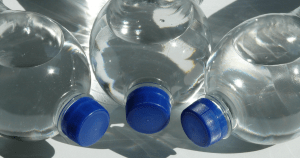What Happens If You Leave A Water Bottle In A Hot Car?

Leaving your belongings in a parked car is a common practice, especially when you know your vehicle will be exposed to the elements. Whether it’s a jacket, a book, or a snack, the car often doubles as a temporary storage unit. But what about bottled water? Can you leave it in a hot car and still safely quench your thirst later? In this article, we delve into the nitty-gritty of how long you can leave bottled water in a hot car.
Difference Between Plastic and Reusable Bottled Water
Before we explore the repercussions of leaving bottled water in a hot car, it’s crucial to distinguish between disposable plastic bottles and reusable ones.
Disposable Plastic Water Bottles
Single-use plastic water containers, commonly manufactured from polyethylene terephthalate (PET), are widely associated with ease and practicality. They offer portability, are lightweight, and typically come in a transparent design that allows users to monitor the water level. The key distinction here is their disposability; they are intended for single-use consumption and are disposed of after their content is consumed.
Reusable Water Bottles
Reusable water bottles, on the other hand, have been gaining prominence for their eco-friendliness and economic efficiency. These containers come in an array of materials, encompassing options such as plastic, stainless steel, and glass. The critical aspect that sets them apart from disposable bottles is their reusability. These containers are crafted to withstand repeated fillings and the demands of daily usage.
What Happens When You Leave Plastic Bottled Water?
Plastic water bottles are designed for convenience and portability. They’re lightweight, transparent, and, most importantly, disposable. However, the very characteristics that make them convenient can also become their downfall when exposed to high temperatures.
Is the Water Still Safe to Drink?
In a perfect world, you might expect that water stored in plastic bottles would remain pristine regardless of the external conditions. Unfortunately, this isn’t the case. PET has a relatively low melting point, around 500 degrees Fahrenheit. When plastic bottles are left in a hot car, especially in scorching climates, it can lead to adverse consequences.
Studies indicate that exposure to elevated temperatures can result in the release of substances like antimony and bisphenol A (BPA) into the water from the plastic. Antimony, used in the production of plastics, is toxic in high doses, while BPA, although making plastic bottles durable, has been categorized as a potential human carcinogen.
The good news is that the levels of BPA found in everyday life are typically too low to cause harm, according to the FDA. Additionally, Cancer Research UK asserts that it is generally safe to drink from plastic bottles, even when they have been exposed to heat for extended periods. Nonetheless, why venture into uncertainty when there are more secure options available?
Furthermore, the situation becomes more intricate when contemplating single-use bottles that have been unsealed, consumed from, resealed, and subsequently placed in a hot car. What was once pure and sanitary bottled water may now contain traces of bacteria introduced during drinking. The heat in the car accelerates the growth of these microorganisms, posing a potential health risk.
What Can You Do?
If you’ve been in the habit of storing disposable plastic water bottles in your car, it’s high time to reconsider. The best practice is to avoid leaving them in hot environments, particularly for extended periods. The potential risks, albeit low, are not worth taking when you can opt for safer alternatives. It would be in your best interest to dispose of the bottled water instead of trying to drink it and put your health at risk.
What Happens When You Leave Reusable Bottled Water?
Reusable water bottles have gained popularity for being eco-friendly and cost-effective. These are available in a range of materials, encompassing plastic, stainless steel, and glass. While they offer several advantages over disposable bottles, they are not immune to the effects of heat.
Is the Water Still Safe to Drink?
Reusability comes with the responsibility of ensuring that your bottle material can withstand the heat. Many reusable plastic water bottles are now manufactured to be BPA-free, reducing the risk of chemical leaching when exposed to high temperatures. This renders them a more secure option when juxtaposed with their single-use counterparts.
The beauty of using a reusable water bottle lies in the ability to select the material that best suits your needs. For example, stainless steel and glass bottles are far less prone, or perhaps not prone at all, to leaching chemicals into your water when exposed to high temperatures during extended periods in a hot car.
What Can You Do?
While reusable bottles offer better resistance to heat-related issues, it’s still advisable to exercise caution. Just as with plastic bottles, the heat can foster the growth of microorganisms and may lead to a less pleasant-tasting drink. To mitigate these concerns:
- Select the Right Material – Opt for reusable bottles made from materials less prone to leaching, such as stainless steel or glass.
- Practice Hygiene – Ensure your bottle is clean and free from lingering bacteria before filling it with water.
- Store Safely – Just like plastic bottles, keep your reusable bottle away from direct sunlight and out of excessively hot environments to preserve water quality.
Leaving Bottled Water in a Hot Car is Not A Good Idea
In conclusion, while the occasional sip of water from a bottle left in a hot car is unlikely to harm you, it’s not a habit to endorse. Disposable bottles are prone to degradation and should be avoided, primarily due to their detrimental impact on the environment. Investing in a reusable bottle not only promotes eco-friendliness but also guarantees a safer experience when it comes to heat exposure.
Whether you prefer a BPA-free plastic, stainless steel, or glass bottle, proper care and hygiene are essential. By selecting the right material, ensuring your bottle is clean, and storing it away from direct sunlight, you can enjoy the benefits of staying hydrated without compromising your health and the environment. In the context of bottled water and hot automobiles, it is wiser to exercise an abundance of caution.

